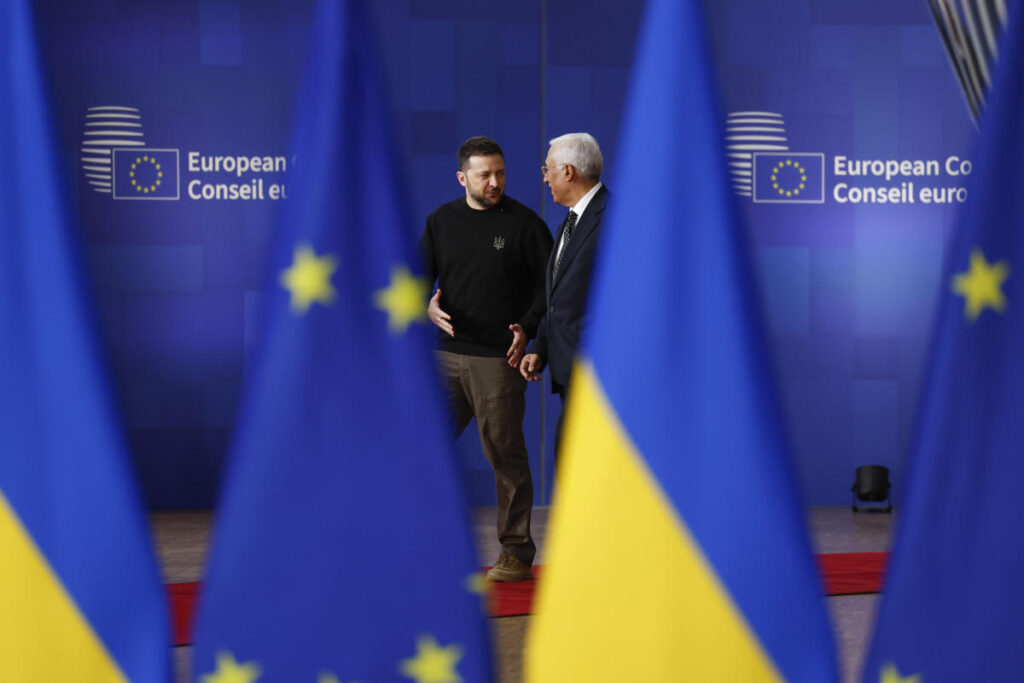European Union leaders recently reaffirmed their commitment to Ukraine’s sovereignty and decision-making in a summit held in Brussels with President Volodymyr Zelenskyy. As the ongoing conflict with Russia approaches a grim milestone of over one thousand days, Ukraine faces significant challenges, including Russian advances on the battlefield, a devastated energy network, and recruitment shortages for its military. In light of these conditions, EU heads of state emphasized that any future discussions regarding Ukraine’s fate must include its participation and without undermining the collaborative spirit among European partners. This insistence on dialogue and collaboration signals a cautious approach as geopolitical dynamics shift, especially with the impending inauguration of U.S. President-elect Donald Trump.
The situation in Ukraine remains tenuous as Russia continues to push westward amid reports of severe casualties among its forces. European leaders are also wary of potential negotiations that might emerge in the future, particularly in light of rumors suggesting that peace talks could be on the horizon for early 2025. There is a prevailing concern that these negotiations could lead to a compromise detrimental to Ukraine if held without adequate representation and involvement from Ukrainian officials. EU leaders made it clear that their priority is to fortify Ukraine’s position, underscoring the need for a united front against any Russian aggression, while simultaneously being cautious not to reveal their strategic plans to Moscow.
In their discussions, German Chancellor Olaf Scholz emphasized the necessity of maintaining long-term support for Ukraine and ensuring that the country receives crucial military aid, including air defense systems, artillery, and munitions. Scholz articulated a willingness to continue cooperation with the incoming administration of Donald Trump, suggesting that the relationship between the U.S. and Europe could still thrive despite Trump’s prior comments about rapprochement with Russia. Luxembourg’s Prime Minister Luc Frieden echoed this sentiment, insisting that Ukraine’s future is a matter for Europe to decide collectively, with Ukraine’s interests at the forefront of all decisions. The leaders collectively voiced a firm stance that decisions affecting Ukraine’s future should not be made without its authoritative input.
The call for Ukraine’s agency in future discussions is further underscored by Dutch Prime Minister Dick Schoof, who reiterated that only Ukraine can determine the timing and conditions for potential negotiations. This reflects a broader sentiment shared among European leadership regarding the importance of Ukraine’s autonomy in any peace efforts. President Zelenskyy himself remarked on the need for continued unity between the EU and the U.S. to effectively counter Russian expansionism, asserting that NATO membership remains the best guarantee for Ukraine’s security. He remained tight-lipped about the precise nature of any discussions with European partners, highlighting the uncertain landscape that surrounds peace negotiations.
The uncertainty surrounding Donald Trump’s upcoming presidency poses additional challenges, given his previous handling of foreign policy matters, particularly with the Taliban in Afghanistan. Analysts have drawn parallels between the outcomes of U.S. decisions in Afghanistan and the risk that Trump may sideline Ukrainian government concerns in favor of direct negotiations with Russia. Trump’s past actions have raised concerns among European leaders regarding the potential for a repeat scenario in Ukraine, where U.S.-Russia relations could overshadow Ukrainian interests, leading to an unfavorable outcome for the war-torn nation’s sovereignty.
While the EU’s financial support for Ukraine has been substantial, providing more than 180 billion euros since the full-scale invasion began, there are doubts about the bloc’s capacity to deliver effective military support in the way that Ukraine’s armed forces require to achieve a decisive victory. The recent summit reflects a careful balancing act for European leaders, who must navigate the geopolitical landscape with the knowledge that Ukraine’s future hinges on both maintaining its independence and garnering ongoing international support in the face of persistent Russian threats. As they confront these dual objectives, EU leaders remain committed to the principle of “nothing about Ukraine without Ukraine,” navigating the complexities of upcoming international developments with caution and strategic intent.

